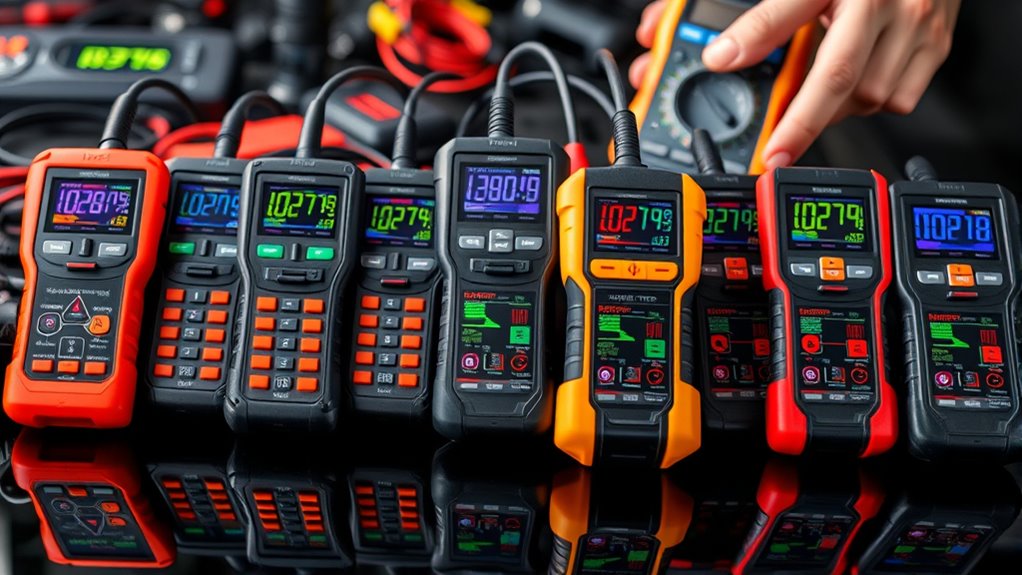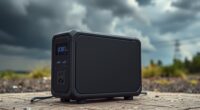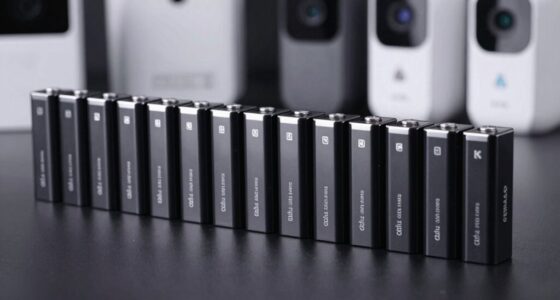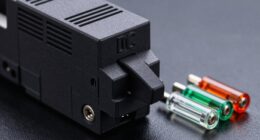I’ve reviewed the top battery load testers for 2025 and found options like the BT500, FOXWELL NT301 Plus, and ANCEL BST200, which deliver high accuracy, quick results, and versatile compatibility for 6V to 24V systems. These tools are great for DIYers and pros alike, offering reliable diagnostics with safety features and ease of use. If you’re curious about which model fits your needs best, stay tuned—I’ll share more details on their features and benefits.
Key Takeaways
- Features supports for a wide range of batteries (5-3000 CCA) and vehicle types, ensuring versatile diagnostic capabilities.
- Prioritize models with high accuracy (up to 99.99%) and rapid testing results within seconds for reliable diagnostics.
- Look for user-friendly interfaces, large displays, and portable designs suitable for professional and DIY use.
- Ensure safety features like reverse polarity protection, impact-resistant construction, and compatibility with different environments.
- Consider tools with data storage, transfer options, and advanced metrics like SOH, SOC, and waveform analysis for comprehensive analysis.
Car Battery Load Tester 6V-24V (BT500)

If you’re looking for a reliable, versatile battery tester that’s perfect for both DIY enthusiasts and professionals, the Car Battery Load Tester 6V-24V (BT500) stands out. It supports batteries from 5 to 3000 CCA, including flooded, AGM, GEL, and EFB types, making it compatible with cars, trucks, motorcycles, and boats. The BT500 performs multiple diagnostics—voltage, internal resistance, CCA, and alternator efficiency—delivering results up to 99.99% accuracy. Its user-friendly interface features a large LCD display and durable construction, with safety features like reverse polarity protection. It’s an essential tool for proactive maintenance and troubleshooting across various vehicle types.
Best For: DIY enthusiasts and professional mechanics seeking a reliable, versatile, and accurate battery tester for a wide range of vehicle batteries.
Pros:
- Supports multiple battery types and sizes from 6V to 24V, including flooded, AGM, GEL, and EFB batteries
- Provides comprehensive diagnostics such as voltage, internal resistance, CCA, and alternator efficiency with high accuracy up to 99.99%
- User-friendly with a large LCD display, durable construction, and safety features like reverse polarity protection
Cons:
- Lacks waterproofing, limiting outdoor or marine use
- Does not include a carrying case or touchscreen interface
- May require familiarity with testing procedures for optimal use
FOXWELL NT301 Plus OBD2 Scanner and Battery Tester
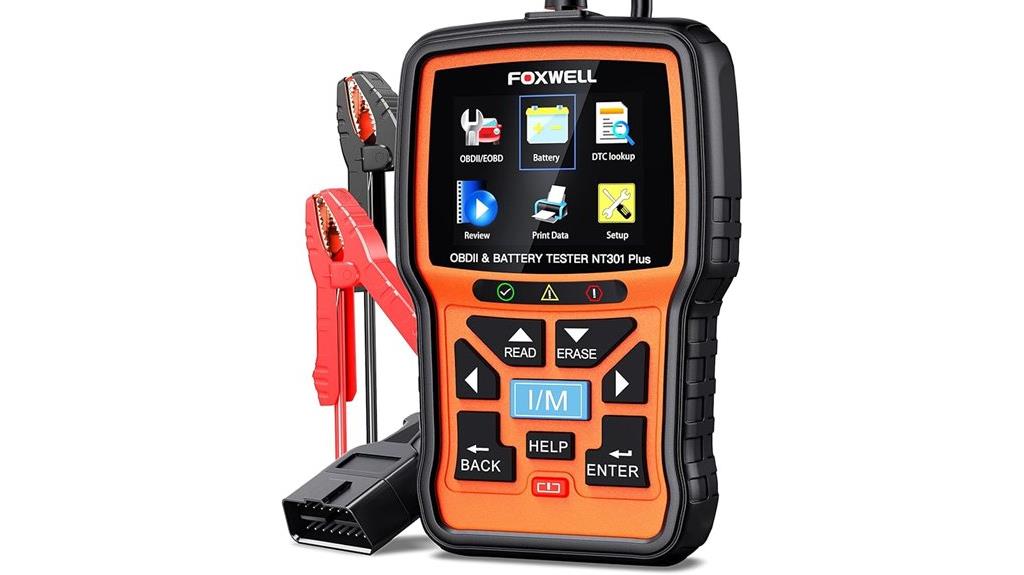
The FOXWELL NT301 Plus stands out as an excellent choice for both DIY enthusiasts and professional mechanics who need a versatile diagnostic tool. It combines an OBD2 scanner with a battery tester, supporting major protocols and compatible with vehicles from 1996 onward. It quickly reads engine codes, resets CELs, and provides live data, while also evaluating battery health—covering SOH, SOC, CCA, and charging status—even in cold weather. Its user-friendly interface features a large color screen, LED alerts, and easy code reading. Compact and durable, it’s backed by FOXWELL’s trusted quality and free lifetime updates, making it a reliable, all-in-one diagnostic solution.
Best For: DIY car enthusiasts and professional mechanics seeking an all-in-one diagnostic tool that combines engine and battery testing with easy-to-use features.
Pros:
- Supports major OBDII protocols and vehicle compatibility from 1996+ for comprehensive diagnostics.
- Combines engine code reading, live data, and battery health testing in one device, saving time and cost.
- User-friendly interface with a large color screen, LED alerts, and free lifetime software updates.
Cons:
- Some users report that the code erasure option appears too early in the menu, causing minor confusion.
- Not compatible with certain vehicle brands or models, such as Fiat, Alfa, and some Mercedes Sprinter 2019.
- It is not wireless, which may limit convenience for some users preferring Bluetooth or Wi-Fi connectivity.
ANCEL BST200 Car Battery Tester 12V Automotive Battery Load Tester Tool
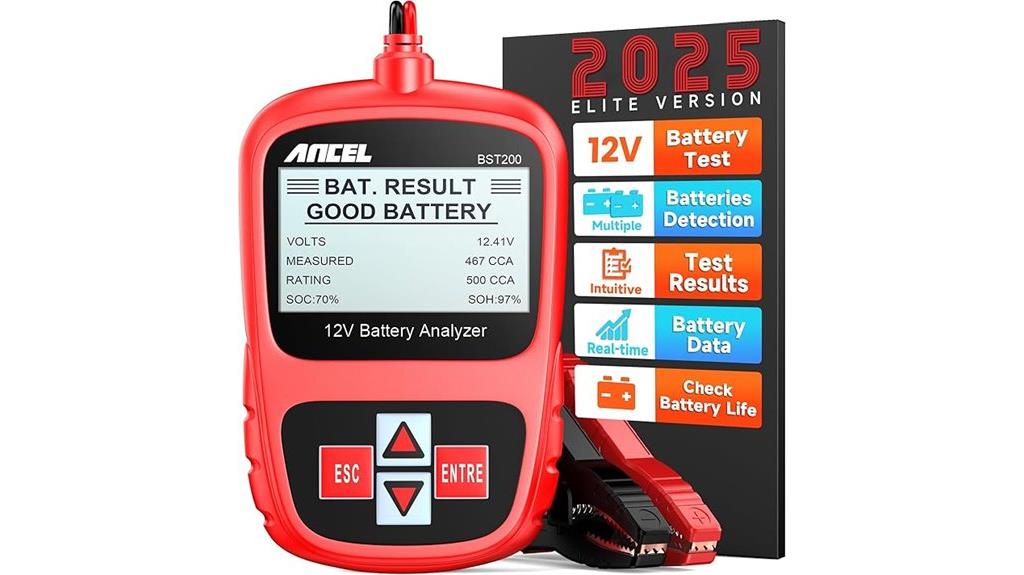
The ANCEL BST200 Car Battery Tester stands out as a top choice for automotive enthusiasts and professionals who need quick, accurate diagnostics across a variety of battery types. It’s compatible with 12V lead-acid batteries, including flooded, AGM, GEL, and spiral types, suitable for cars, trucks, motorcycles, boats, and more. It provides essential data like CCA, voltage, internal resistance, SOC, and SOH in seconds. Its user-friendly design includes four simple buttons and plug-and-play operation, delivering nearly 99.99% accuracy. Compact and lightweight, it’s perfect for on-the-go testing, helping prevent roadside breakdowns and ensuring your battery’s health at all times.
Best For: automotive enthusiasts, professional mechanics, and vehicle owners seeking quick, reliable battery diagnostics for a variety of 12V lead-acid batteries across different vehicle types.
Pros:
- Highly accurate (up to 99.99%) and fast testing results within seconds.
- Compatible with multiple battery types including flooded, AGM, GEL, and spiral lead-acid batteries.
- User-friendly with plug-and-play design and clear interface, suitable for both professionals and beginners.
Cons:
- Limited to 12V lead-acid batteries, not suitable for lithium or other battery chemistries.
- Requires batteries for power, which may add to maintenance considerations.
- Slightly larger size may be less convenient for very tight storage spaces.
VDIAGTOOL BT300 Car Battery Tester
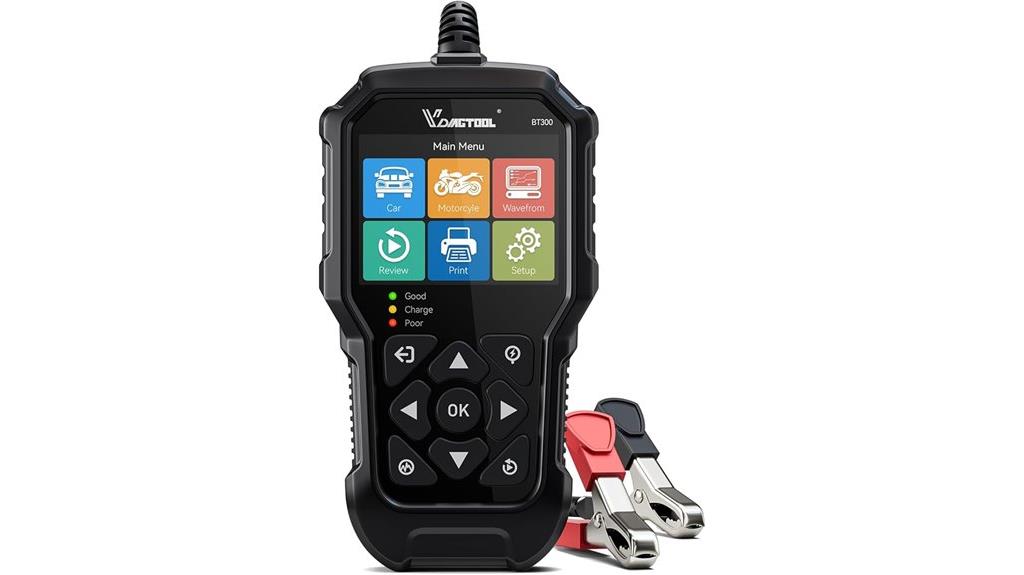
For professionals and enthusiasts seeking quick, accurate battery diagnostics, the VDIAGTOOL BT300 Car Battery Tester stands out with its lab-grade precision and user-friendly design. It tests 6V and 12V lead-acid batteries, including VRLA, AGM, GEL, and LSI types, supporting a wide CCA range up to 3000. The device offers instant, 99.99% accurate results on a clear 2.8-inch HD display, with features like waveform analysis and LED health indicators. Its Bluetooth connectivity and companion app allow for easy recording and tracking of test data. Compact and durable, the BT300 simplifies diagnostics for both professional and personal use, helping prevent breakdowns and optimize vehicle maintenance.
Best For: vehicle owners, professional mechanics, and fleet managers who need quick, accurate diagnostics of lead-acid batteries to prevent breakdowns and maintain vehicle performance.
Pros:
- Provides lab-grade accuracy with 99.99% precision in seconds
- Supports a wide range of lead-acid batteries including VRLA, AGM, GEL, and LSI types
- Features Bluetooth connectivity and a companion app for easy data recording and tracking
Cons:
- Not compatible with lithium batteries
- Longer cables and clamp quality could be improved based on user feedback
- Requires batteries for power, limiting use if batteries are depleted
TOPDON BT100 Car Battery Tester
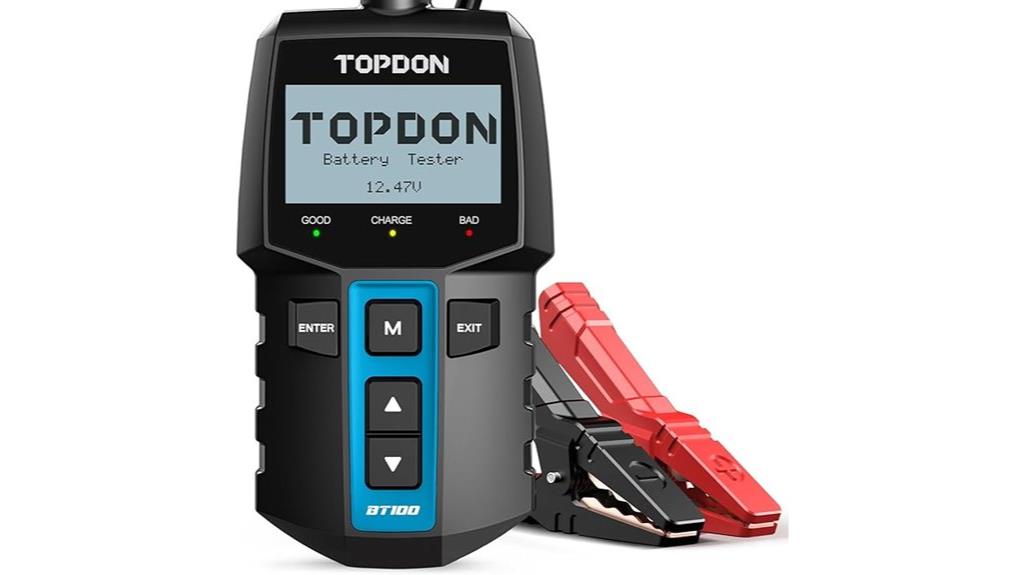
If you’re seeking a reliable, user-friendly battery tester that delivers professional-grade diagnostics, the TOPDON BT100 stands out as an excellent choice. Compact and easy to operate, it tests 12V automotive batteries rated from 100 to 2000 CCA, including flooded, AGM, GEL, and EFB types. It offers detailed data like SOH, SOC, voltage, and capacity, with results displayed clearly on a color-coded LED screen. The device performs health assessments, cranking tests, and charging system checks in seconds. Its intuitive menu, safe copper clamps, and portable design make it perfect for DIY enthusiasts and professionals alike, ensuring quick, accurate diagnostics on the spot.
Best For: DIY enthusiasts and automotive professionals seeking a reliable, accurate, and easy-to-use battery tester for quick on-the-spot diagnostics.
Pros:
- Provides comprehensive diagnostic data including SOH, SOC, voltage, current, and capacity.
- Compact, portable design with an intuitive interface and quick results.
- Safe, high-quality copper clamps with reverse polarity protection and spark-proof features.
Cons:
- Clamp springs may weaken over extended use, potentially affecting connection quality.
- Instruction manual is only available in English, which may be a barrier for non-English speakers.
- Limited to testing 12V batteries within the specified CCA range, not suitable for larger or different voltage systems.
ANCEL BA101 Car Battery Tester, 12V Digital Automotive Alternator Meter
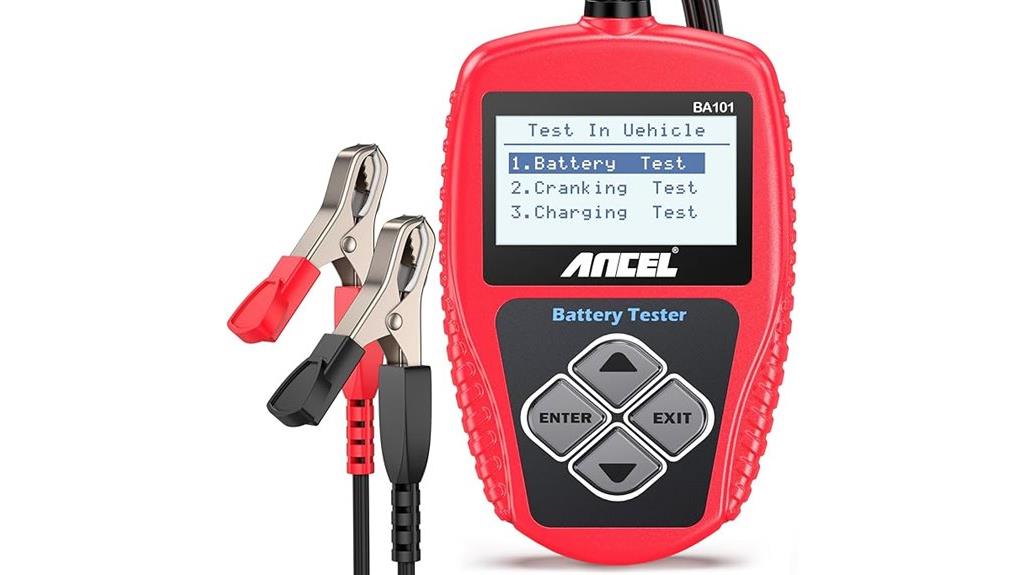
When it comes to reliable diagnostics for lead-acid batteries, the ANCEL BA101 Car Battery Tester stands out with its advanced crocodile clips and high-conductivity copper contacts, ensuring secure and accurate connections. This compact device supports 12V batteries across various vehicle types, including trucks, boats, and RVs, and tests multiple battery chemistries like Flooded, AGM, GEL, and EFB. It measures battery health, voltage, and charge, performing cranking and charging system tests quickly. Its large LCD display, intuitive interface, and safety features make it easy to use. Highly rated for accuracy and build quality, it’s a practical choice for anyone needing fast, reliable lead-acid battery diagnostics.
Best For: vehicle owners and technicians seeking quick, accurate diagnostics of lead-acid batteries across various vehicle types including trucks, boats, and RVs.
Pros:
- Supports multiple lead-acid battery chemistries (Flooded, AGM, GEL, EFB) for versatile testing.
- Features advanced crocodile clips and high-conductivity copper contacts for secure, reliable connections.
- Easy-to-read LCD display with adjustable contrast and backlight, making diagnostics straightforward even in low-light conditions.
Cons:
- Does not support testing lithium, 6V/8V, or 24V batteries, limiting its use to 12V lead-acid batteries only.
- Requires manual input of battery capacity (AH) or CCA for load testing, which may be less convenient for some users.
- Designed primarily for lead-acid batteries; not suitable for testing other battery types like lithium-ion.
Car Battery Tester 6V-24V VDIAGTOOL BT500
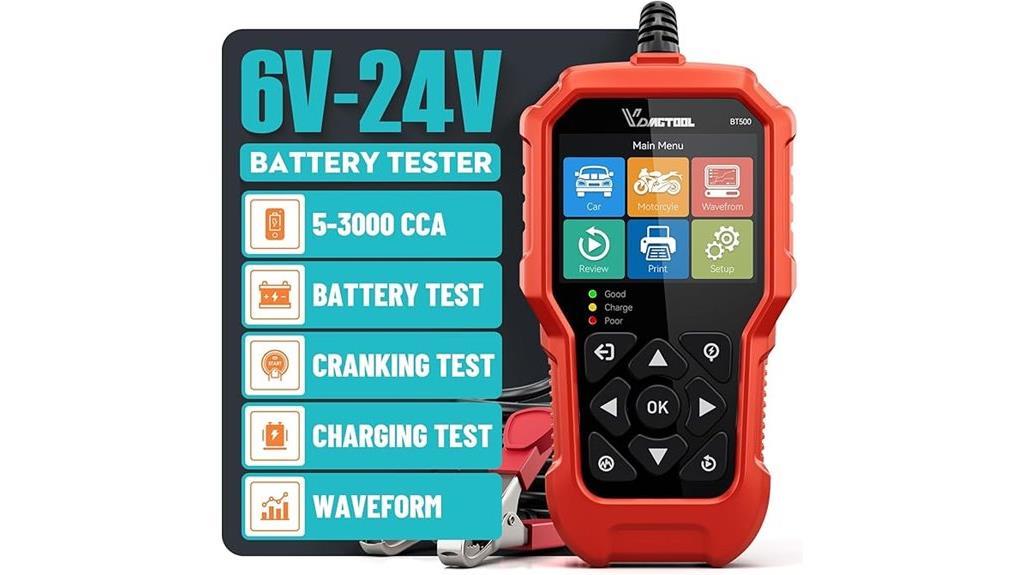
The VDIAGTOOL BT500 stands out as an ideal choice for both DIY enthusiasts and professionals seeking a versatile and precise battery tester. It supports 6V, 12V, and 24V batteries, covering a wide range of vehicles, including cars, trucks, boats, and motorcycles. With testing capabilities for voltage, internal resistance, CCA, SOH, and SOC, it provides thorough insights into battery health and performance. Its intuitive interface and large LCD make operation straightforward, while safety features like reverse polarity protection and spark-proof design ensure reliable use. The durable build and professional accuracy make the BT500 a valuable tool for proactive vehicle maintenance.
Best For: DIY mechanics and professionals seeking a reliable, versatile battery tester for various vehicle types and battery configurations.
Pros:
- Supports multiple battery voltages (6V, 12V, 24V) and types, including flooded, AGM, GEL, and EFB batteries.
- Provides comprehensive testing features such as voltage, internal resistance, CCA, SOH, and SOC for thorough analysis.
- User-friendly with an intuitive interface, large LCD display, and safety protections like reverse polarity and spark-proof design.
Cons:
- Not suitable for testing lithium batteries.
- Lacks waterproof features, so outdoor or marine use requires caution.
- Does not include a carrying case or touchscreen, which could enhance portability and ease of use.
OTC 3181 130 Amp Heavy-Duty Battery Load Tester Black
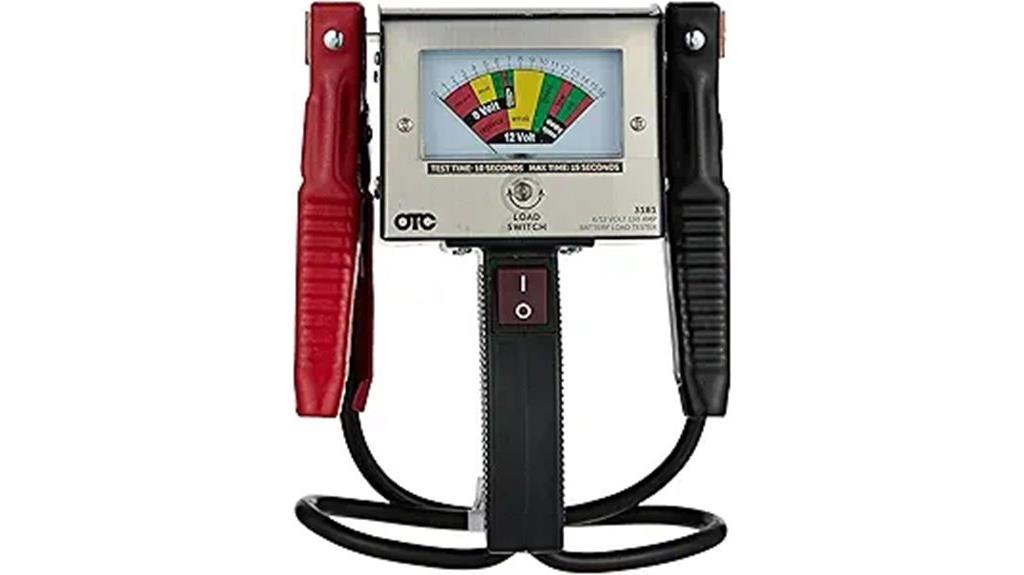
The OTC 3181 130 Amp Heavy-Duty Battery Load Tester stands out for its rapid, accurate testing capabilities, delivering results within 10 seconds. It applies a robust 130-amp load, ensuring reliable assessments of 6V and 12V batteries across automotive, marine, and tractor applications. Its ergonomic design features full-size clamps for a secure grip and an extra-large display for easy reading. Despite weighing about 2.75 pounds, it’s portable and durable, with side tabs and back brackets for storage and mounting. Users praise its quick, precise results and sturdy build, making it a trusted tool for diagnosing battery health efficiently.
Best For: automotive, marine, and tractor enthusiasts or professionals who need quick, reliable battery testing to prevent unnecessary replacements and ensure vehicle readiness.
Pros:
- Delivers accurate results within 10 seconds with a robust 130-amp load.
- Ergonomically designed with full-size clamps and a large, easy-to-read display.
- Durable, portable construction with mounting options for versatile use.
Cons:
- Generates heat during multiple tests, requiring cooling down periods.
- Analog voltage display may have a slight drift (~1.3 volts) needing zero adjustment.
- Heavier than digital testers at approximately 2.75 lbs, which may affect portability for some users.
KONNWEI KW208 12V Car Battery Tester
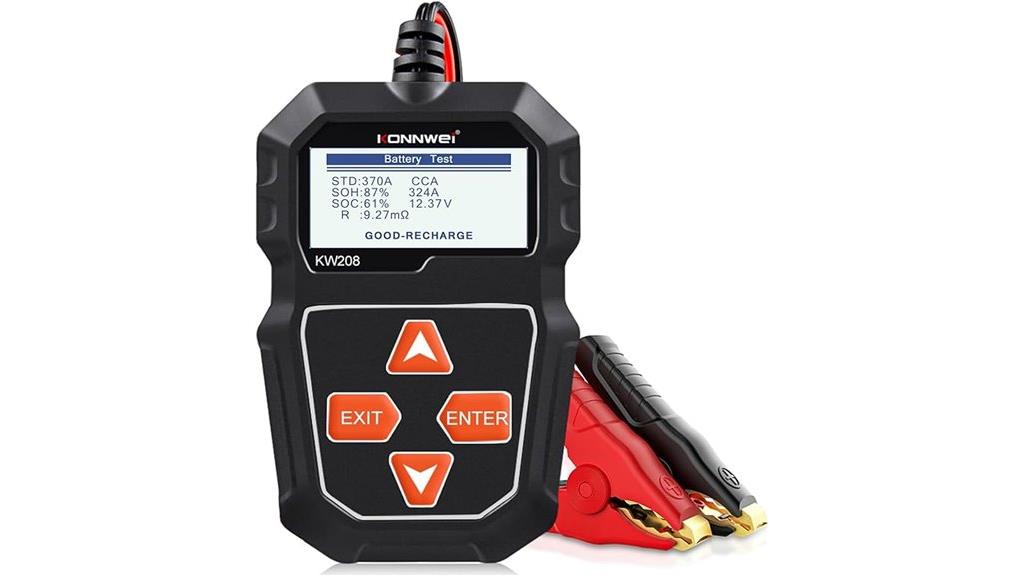
If you’re looking for an affordable yet highly accurate battery tester, the KONNWEI KW208 12V Car Battery Tester stands out as an excellent choice. It supports various battery types, including flooded, AGM, and gel, and tests everything from voltage to internal resistance, cold cranking amps, and capacity. Powered directly from your vehicle, it’s quick, easy, and reliable, providing results with over 99.7% accuracy thanks to its smart AI chip. Compact and lightweight, it fits in your glove box and works in-vehicle or out-of-vehicle. Perfect for routine checks, it’s a must-have tool for DIYers and professionals alike.
Best For: DIY car owners, professional mechanics, and vehicle enthusiasts seeking an accurate, easy-to-use battery testing tool.
Pros:
- Highly accurate results with over 99.7% precision thanks to smart AI technology
- Supports multiple battery types including flooded, AGM, and gel for versatile testing
- Compact, lightweight, and portable, fitting conveniently in glove boxes or toolkits
Cons:
- Requires correct input of battery CCA and type for optimal accuracy
- Small manual with limited instructions may be challenging for some users
- Less effective at low temperatures and may produce false readings when testing remote terminals in hybrid vehicles
Battery Load Tester for 12V and 24V Vehicles
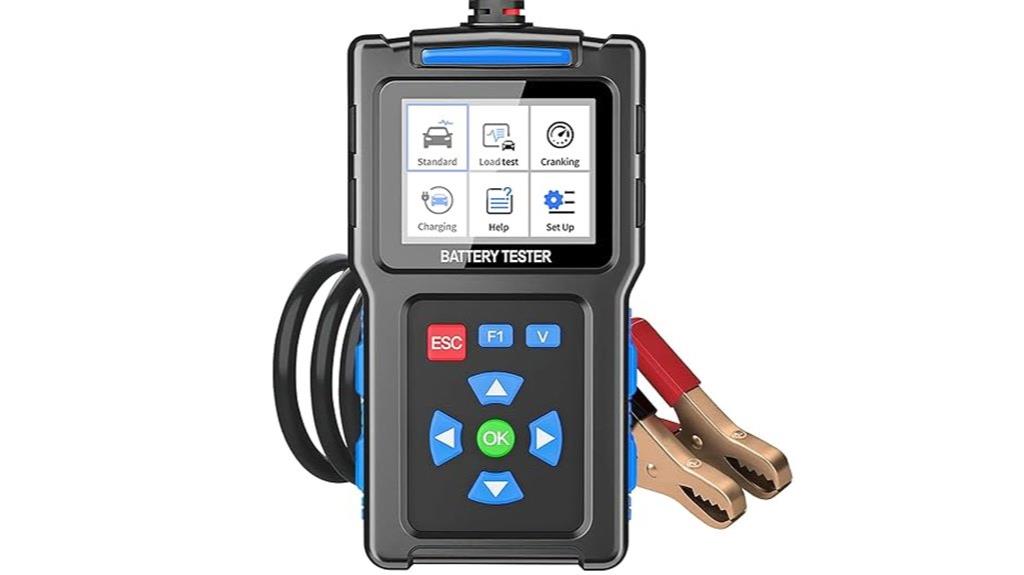
For anyone seeking reliable diagnostics for 12V and 24V vehicle batteries, the BT300 stands out with its support for a wide range of battery types and vehicle systems. It tests flooded, AGM, GEL, and EFB batteries across cars, trucks, SUVs, boats, RVs, and motorcycles. With high accuracy (99.8%) and precise measurements within ±0.01V, it offers voltage, CCA, and alternator assessments. The device is easy to use, providing quick or standard tests, and features protections against reverse polarity and overcurrent. Its durable ABS shell and USB upgrade port ensure longevity and future-proofing, making it a top choice for extensive battery diagnostics.
Best For: DIY enthusiasts, auto technicians, and vehicle owners seeking accurate, versatile battery diagnostics for 12V and 24V systems across various vehicle types.
Pros:
- Supports multiple battery types including flooded, AGM, GEL, and EFB for broad compatibility.
- High accuracy (99.8%) with precise measurements within ±0.01V, ensuring reliable results.
- Durable ABS shell with protections against reverse polarity, overcurrent, and overvoltage enhances safety and longevity.
Cons:
- Not compatible with 6V or lithium batteries, limiting its use to specific battery types.
- Requires proper pre-charging and input of battery parameters for optimal accuracy; incorrect data may affect results.
- Does not include rechargeable power; depends on vehicle connection and USB for firmware updates, which may be less convenient for some users.
Battery Load Tester for Car Batteries and Alternators
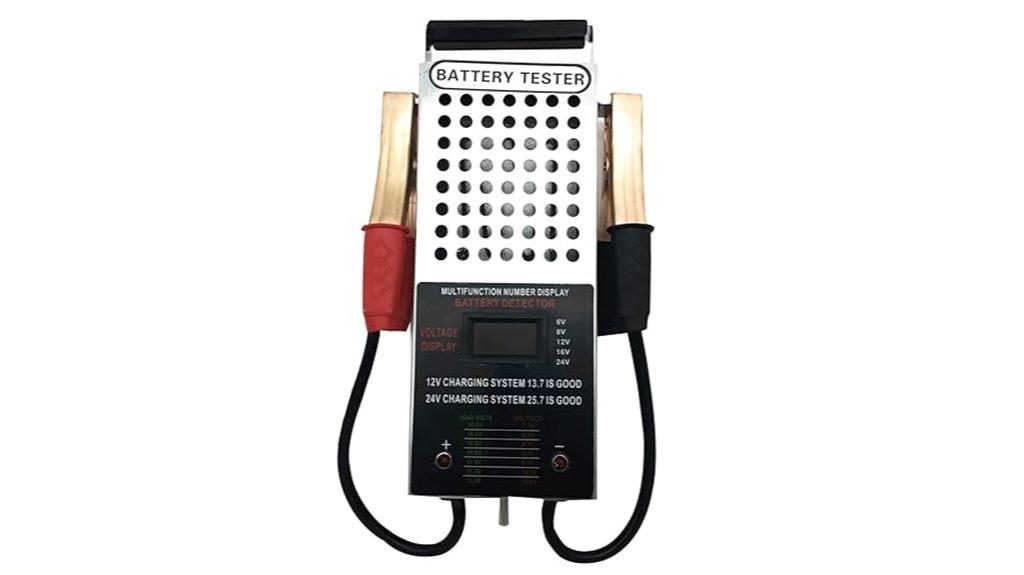
Battery load testers designed for car batteries and alternators are essential tools for anyone wanting quick, accurate diagnostics without visiting a shop. These testers evaluate battery condition, load capacity, and charge system health, making them versatile for cars, trucks, SUVs, motorcycles, RVs, boats, and beach bikes. They support up to 100A for 12V batteries and include copper clip connectors with rubber grips for safe, reliable contact. Simple to operate, they simulate starter motor loads for up to 10 seconds, providing clear, easy-to-read results. Their portable design and safety features make them perfect for DIY diagnostics at home or in the garage.
Best For: DIY vehicle owners, auto technicians, and car enthusiasts needing quick, accurate battery and alternator diagnostics for various vehicle types at home or in the garage.
Pros:
- Supports high load currents of up to 100A for 12V batteries, ensuring precise testing.
- Portable and lightweight design with insulated carry handle for easy transport and use anywhere.
- Uses copper clip connectors with rubber grips for safe, reliable contact with battery terminals.
Cons:
- Limited to testing batteries and alternators up to 12V and 6V, not suitable for higher voltage systems.
- Short load application time of up to 10 seconds may require multiple tests for comprehensive analysis.
- Requires manual clipping and operation, which might be less convenient for users seeking automated testing features.
ANCEL BA101 Plus Car Battery Tester
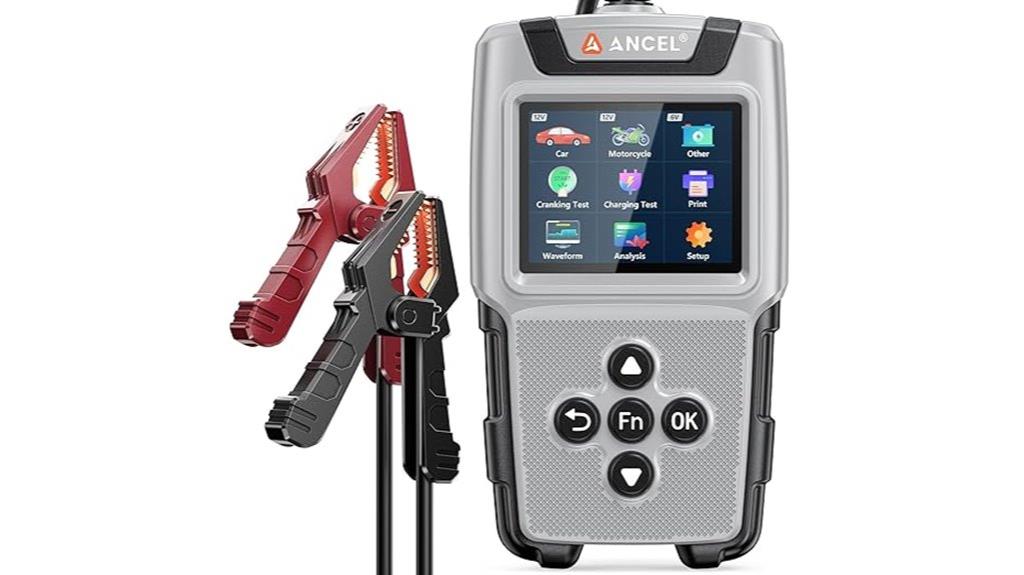
The ANCEL BA101 Plus Car Battery Tester stands out as an excellent choice for professional mechanics and serious DIY enthusiasts who need detailed, accurate diagnostics. It supports 6V and 12V lead-acid batteries, including various types like AGM and Gel, measuring CCA, internal resistance, voltage, SOH, and SoC. It quickly analyzes cranking and charging systems, helping diagnose alternator or starter issues. The device features a user-friendly 2.8-inch color TFT screen, intelligent chips for 99.9% accuracy, and data storage for up to 1,400 tests. Built-in safety protections and durable construction make it reliable for all vehicle types, from cars to boats.
Best For: professional mechanics and serious DIY enthusiasts seeking comprehensive, accurate diagnostics for a variety of lead-acid vehicle batteries and electrical systems.
Pros:
- Supports multiple battery types and measures key parameters like CCA, SOH, and internal resistance for detailed analysis.
- Equipped with a bright 2.8-inch color TFT screen and USB data transfer for easy operation and record-keeping.
- Built-in safety protections and durable design ensure reliable performance across different vehicle types and weather conditions.
Cons:
- Slight learning curve for new users unfamiliar with advanced battery diagnostics.
- Higher price point compared to basic testers, which may be a concern for casual users.
- Performance is optimal on flat surfaces and in well-lit environments, potentially limiting use in cramped or poorly lit engine bays.
KINGBOLEN Car Battery Tester (BM550)
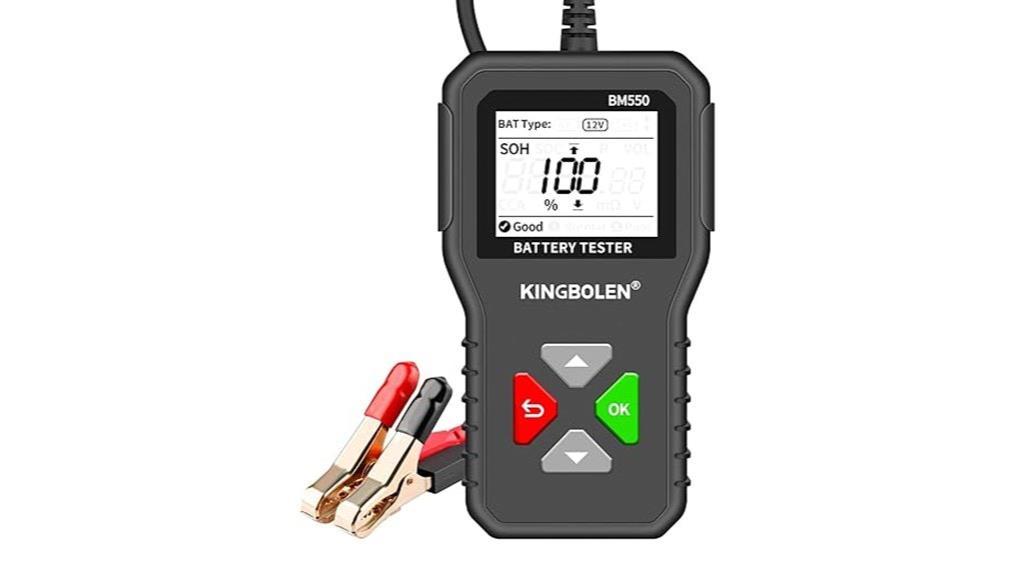
If you’re seeking a reliable, easy-to-use tester that delivers quick and accurate results, the KINGBOLEN BM550 stands out as an excellent choice. It supports 6V, 12V, and 24V batteries, testing from 100 to 2000 CCA and capacities up to 220Ah. Compatible with various battery types like flooded, AGM, GEL, and EFB, it works on cars, trucks, motorcycles, boats, and ATVs. The device provides instant readings of CCA, voltage, internal resistance, SOH, and SOC on a clear HD screen. Its plug-and-play design, auto-on feature, and reverse polarity protection make it practical and safe for both DIYers and professionals.
Best For: DIY enthusiasts, automotive professionals, and garage technicians seeking a reliable, quick, and versatile battery tester for various vehicle types and battery formats.
Pros:
- Supports multiple battery voltages and types, including flooded, AGM, GEL, and EFB.
- Provides fast, accurate readings of CCA, voltage, internal resistance, SOH, and SOC on a clear HD display.
- Auto-on feature with reverse polarity protection enhances safety and ease of use.
Cons:
- Proper clamp contact is essential; loose connections can lead to inaccurate results.
- Bright sunlight may cause glare on the screen, affecting readability.
- Some users report minor issues like loose wires or durability concerns over long-term use.
FOXWELL BT705 Car Battery Tester

For professionals and serious DIYers seeking quick, accurate diagnostics, the FOXWELL BT705 stands out with its ability to test both 12V and 24V batteries across a wide range of vehicle types. It offers 99.9% accuracy and supports flooded, AGM, spiral, and GEL batteries from 100 to 2000 CCA. The device quickly assesses battery health, SOH, SOC, and system performance, even in cold conditions below 0°F. Its large LCD screen, 5.9-foot test cable, and straightforward operation make it user-friendly. With no app needed and reliable results backed by over 14 years of expertise, the BT705 is a top choice for all-encompassing diagnostics.
Best For: professional automotive technicians and serious DIYers who need quick, accurate diagnostics for a wide variety of 12V and 24V vehicle batteries.
Pros:
- Provides 99.9% accurate testing results for multiple battery types and vehicle applications.
- Supports testing of flooded, AGM, spiral, and GEL batteries from 100 to 2000 CCA.
- Features a large 2.8-inch LCD screen and 5.9-foot test cable for easy, solo operation in various environments.
Cons:
- May require some familiarity with vehicle electrical systems for optimal use.
- No Bluetooth or app connectivity, limiting remote data management options.
- Testing inside vehicles may require disconnecting accessory loads and following specific procedures for best results.
Schumacher Electric 100A Car Battery Load Tester and Voltmeter

Designed for both professional and hobby mechanics, the Schumacher Electric BT-100 stands out with its ability to perform multiple tests—battery health, charging system, and starter motor—all in one compact device. It tests 6V and 12V batteries up to 1000 cranking amps, suitable for cars, motorcycles, boats, and more. Easy to operate with a top-mounted switch and clear meter, it provides quick, accurate results. Built with durability in mind, it features a retro steel case, ventilated face, and heavy-duty clamps. Trusted for over 75 years, this tester is a reliable tool for diagnosing common battery and electrical issues effectively.
Best For: both professional and hobby mechanics seeking a reliable, all-in-one battery and electrical system tester for various vehicles and batteries.
Pros:
- Combines battery analysis, charging system diagnosis, and starter motor testing in one device for versatile use.
- Easy to operate with a clear, highly visible meter and simple top-mounted switch, suitable for users of all experience levels.
- Durable construction with a retro steel case, ventilated face, and heavy-duty clamps ensures long-lasting performance.
Cons:
- May emit smoke initially due to burning off dust or contaminants on the heating element, which is normal but can concern some users.
- Gets hot during use, requiring caution and proper handling to prevent overheating.
- Digital multimeters are recommended for precise voltage verification, adding an extra step for complete diagnostics.
Factors to Consider When Choosing a Battery Load Tester Tool

When selecting a battery load tester, I look at how well it works with different battery types and how accurate and quick its tests are. I also consider how easy it is to operate, along with its safety features and durability. Finally, I check out the display and data options to guarantee I get clear, useful results.
Compatibility With Battery Types
Choosing a battery load tester that’s compatible with your specific battery types is essential for accurate diagnostics. First, verify the tester supports the voltage ratings of your batteries, like 6V, 12V, or 24V, to avoid incorrect readings. Next, confirm it can handle the chemistries you use, such as flooded, AGM, GEL, or EFB batteries, since different types require different testing parameters. It’s also important to check if the device measures the Cold Cranking Amps (CCA) range that matches your battery’s specs, typically from 100 to 3000 CCA. Additionally, see if it can test both in-vehicle and out-of-vehicle batteries for versatility. Finally, verify compatibility with various vehicle types—including cars, trucks, motorcycles, boats, and RVs—to ensure it suits your specific needs.
Testing Accuracy and Speed
Since quick and precise results are essential for effective battery diagnostics, selecting a load tester that offers high testing accuracy and speed is crucial. A top-quality tester can deliver results with 99.99% accuracy, ensuring reliable assessments of battery health. Rapid testing capabilities allow me to evaluate a battery’s condition within seconds, minimizing vehicle downtime. Fast measurements of critical parameters like CCA, voltage, and internal resistance help me make timely maintenance decisions. Accurate load testing also simulates real-world starting conditions, enabling me to identify weak or failing batteries before they cause breakdowns. Consistent speed and precision reduce the need for repeat tests, saving time and increasing my confidence in the diagnosis. Overall, choosing a tool with high accuracy and quick results streamlines my workflow and enhances diagnostic reliability.
Ease of Operation
A battery load tester that’s easy to operate can make all the difference in ensuring accurate and efficient diagnostics. A user-friendly device features a clear, intuitive interface with simple controls like buttons, dials, or touchscreens, making testing straightforward. It should deliver quick, easy-to-understand results without complex setup or technical expertise. Features like automatic battery type detection and clear prompts help prevent mistakes and streamline the process. Visual indicators such as LED lights or digital displays make it simple to interpret battery health at a glance. Additionally, portability and lightweight design allow for single-handed use and quick testing across various locations. Overall, an easy-to-operate tester reduces user error, saves time, and enhances overall diagnostic confidence.
Safety and Durability
When selecting a battery load tester, prioritizing safety and durability guarantees reliable performance and long-term use. Look for built-in safety features like reverse polarity protection, overvoltage safeguards, and short-circuit prevention to keep both users and vehicle electronics safe. A sturdy, impact-resistant casing made from high-quality materials ensures the tester can handle frequent use in workshop or outdoor settings. Secure, insulated clamps with corrosion-resistant connectors help maintain safe, consistent contact during testing and extend the device’s lifespan. Additionally, the device should include overheating prevention through proper ventilation or heat dissipation features. Protective elements like spark-proof design and temperature safeguards reduce damage risks, ensuring the tester remains reliable over time, providing confidence in your diagnostics without compromising safety.
Display and Data Features
Choosing a battery load tester with the right display and data features can considerably streamline your diagnostic process. A clear, high-resolution screen makes reading test results straightforward, even in low-light conditions. I find that viewing multiple parameters at once boosts efficiency, allowing quick comparisons without switching screens. Data features like real-time voltage curves and historical records help track battery health over time, which is invaluable for maintenance planning. Some testers even offer data exporting via USB or Bluetooth, making detailed analysis and record-keeping easier. User-friendly interfaces with intuitive menus and clear indicators reduce the risk of misinterpretation, saving time and preventing errors. Ultimately, these display and data features ensure accurate, quick diagnostics, empowering me to make informed decisions confidently.
Portability and Design
The design and portability of a battery load tester directly impact how easily I can use it in various settings. A compact, lightweight build makes it simple to carry in my vehicle’s glove box or tool kit, ensuring I’m always prepared. Ergonomic features like handle grips, foldable stands, or minimal bulk make testing more comfortable and efficient. I also look for durable, impact-resistant casings that can withstand rough environments and frequent transport. Long cables and clamps are vital for accessing battery terminals in tight spaces without hassle. A streamlined layout with clear displays and minimal buttons helps me operate the device quickly and confidently, even in urgent situations. Overall, a well-designed, portable tester improves usability and reliability wherever I need it.
Frequently Asked Questions
How Do Load Testers Differentiate Between Good and Failing Batteries?
I determine if a battery is good or failing by using a load tester to apply a controlled load and observe the voltage response. A healthy battery maintains a stable voltage, typically above 9.6 volts for a 12V battery, under load. If the voltage drops markedly or quickly, it indicates the battery is weak or failing. This quick test helps me identify issues before more serious problems develop.
Are Digital or Analog Load Testers More Reliable for Diagnostics?
Coincidentally, I find digital load testers more reliable for diagnostics because they provide precise, easy-to-read results that minimize human error. Their advanced features often include data storage and automatic testing, making them more consistent than analog testers. While analog units have their charm, I trust digital testers for accurate, quick assessments. They’re especially helpful when diagnosing complex battery issues, ensuring I get dependable readings every time.
Can These Testers Evaluate Battery Health in Cold Weather Conditions?
Yes, these testers can evaluate battery health in cold weather, but their accuracy might diminish if the battery is extremely cold. I recommend warming the battery slightly before testing for the most reliable results. Digital testers are often better because they provide precise readings even in challenging conditions. Always guarantee your battery is at a manageable temperature to get the most accurate diagnostic data in cold weather.
How Often Should Vehicle Batteries Be Tested With a Load Tester?
Did you know that most vehicle batteries last about 3 to 5 years? I recommend testing your battery with a load tester at least twice a year, especially before winter and summer extremes. Regular checks help catch potential issues early, saving you from unexpected breakdowns. I always stay proactive about testing so I can replace or service my battery before it fails, ensuring reliable performance year-round.
Do Load Testers Also Assess Alternator Performance?
Yes, load testers can help assess alternator performance. When I test a battery, I often check the alternator by observing how well it maintains voltage under load. A healthy alternator should keep the voltage steady while the load test is ongoing. If the voltage drops markedly, it indicates the alternator might be struggling or failing. So, load testing gives me a quick, effective way to evaluate both battery and alternator health.
Conclusion
Choosing the right battery load tester feels like selecting a trusty compass for your car’s journey—reliable, precise, and ready whenever you need it. With these top tools, you’ll confidently navigate any battery challenge, ensuring your vehicle’s heart keeps beating strong. Imagine the satisfaction of knowing your car’s power is always in check, like a lighthouse guiding you safely through every start and stop. Here’s to smooth rides and dependable batteries ahead!

